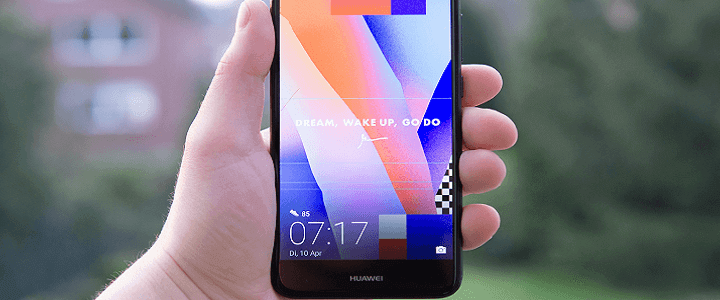Last week U.S. Secretary of State Mike Pompeo urged the UK to reconsider allowing Chinese telco vendor Huawei to be a part of the 5G Internet network in the UK. Earlier this week the UK government announced that the Chinese firm, which has been charged to build parts of the 5G network, would only have access to about 35% of it – and this would exclude “core” elements of the country’s telecoms infrastructure.
In additional Huawei would be labeled a “high-risk vendor” in the UK, despite the fact that the company has worked with the UK’s telecom systems since 2005. The company already provides all four of the UK’s cellular networks with limited 5G technology, but the company doesn’t have access to core national infrastructure, where the personal data of customers is held.
“The government has reviewed the supply chain for telecoms networks and concluded today it is necessary to have tight restrictions on the presence of high risk vendors,” said Digital Secretary Baroness Morgan in a statement. “This is a UK-specific solution for UK-specific reasons and the decision deals with the challenges we face right now.”
Moreover, Ciaran Martin, CEO of the UK’s National Cyber Security Centre told NBC News, “High risk vendors have never been — and never will be — in our most sensitive networks. Taken together these measures add up to a very strong framework for digital security.”
The key word in this might be “sensitive” – as last April the “Five Eyes” intelligence sharing nations committed to never using technology from Huawei in the “sensitive” parts of their respective telecoms networks. Back then Britain announced it would only allow the Chinese firm access to the non-core parts of the 5G networks and would block it from all core parts of the system.
Huawei in the U.S.
Huawei was added to the U.S. Department of Commerce’s Bureau of Industry and Security Entity List in May 2019, following a White House executive order. However, the company has been banned from bidding on U.S. government contracts since 2014. It along with ZTE has also been banned from selling mobile phones on U.S. military bases.
The U.S. government has seen Huawei, along with ZTE, as a serious threat, as the company could have access to vast amounts of personal data that could be supplied to the Chinese government.
“The main security concern about Huawei is that as a Chinese company, it is obligated to carry out intelligence and national security work when directed by the government,” explained Timothy R. Heath, senior international defense researcher at the RAND Corporation.
Real Risk to Security
The question is whether Huawei, which as noted would not have access to the core network, actually poses a clear and present danger, and whether this could impact the intelligence community.
“To date, there has been scant publicly available evidence that Huawei has carried espionage through its commercial products,” Heath told ClearanceJobs.
“However, Chinese laws and the nature of China’s communist party-led political system raise the possibility that Beijing could order Huawei to carry out such activities in the event of tensions or a crisis involving the U.S. and/ or other western countries,” he added. “Given the sensitivity of national communications infrastructures, it is a risk that national decision makers should not take lightly, especially given the ongoing tensions between Beijing and Washington.”
This is also an issue where countries must consider the most cost effective vendor for the rollout of 5G. This is a major investment, and Huawei has long been known to make very good products while providing quality services. In a global economy this is hard to look past.
“The EU’s decision to adopt Huawei products will add to strains in the relationship with the United States,” said Heath. “However, most likely the U.S. and EU will have to deal with the reality of Chinese technology in EU telecom networks by developing appropriate safeguards and technologies to minimize risks to national security for all parties.”
Special Relationship in Jeopardy
The other significant question is whether the “special relationship” – the official term coined by Winston Churchill to describe the political and diplomatic relations between the UK and the U.S. – would be put in jeopardy. While this likely won’t help matters, it should be noted that there have been moments where it has been tested, including during the Vietnam War and Britain’s invasion of Egypt to recapture the Suez Canal.
The UK and U.S. do have an unparalleled relationship among major world powers when it comes to military planning, sharing of nuclear weapons technology and notably intelligence sharing. It is the latter that could be most affected as the U.S. intelligence community could have valid concerns that Beijing could have access to even a part of the UK’s 5G network.
“I don’t envision this policy by the UK will hurt the ‘special relationship’ in intelligence between the U.S. and the UK,” explained Dr. Vince Houghton, historian/curator at the International Spy Museum in Washington, D.C.
“Huawei is being kept out of the most secret systems, and it’s not like the UK has any desire to be compromised itself,” Houghton told ClearanceJobs. “Even if there is some backlash from the U.S. on this decision, the ‘special relationship’ has survived many bumps and bruises along the way, from spies, to leaks, to ineffectual leadership. It will survive this.”
However, the UK’s decision could add to strains noted the RAND Corporation’s Heath.
“Intel sharing between the UK and other Five Eyes parties is likely to be complicated by the decision,” Heath told ClearanceJobs. “There will need to be new protocols and safeguards to minimize exposure of classified information on networks using Chinese technology. However, the relationship is too important to throw away over the issue. I expect the Five Eyes relationship to continue with the UK.”




